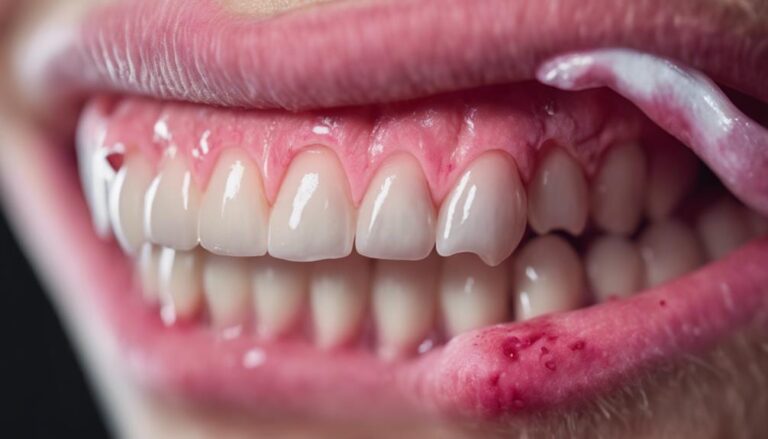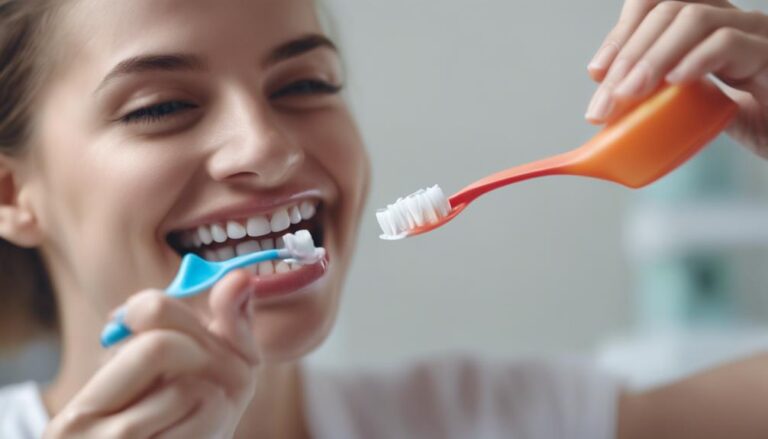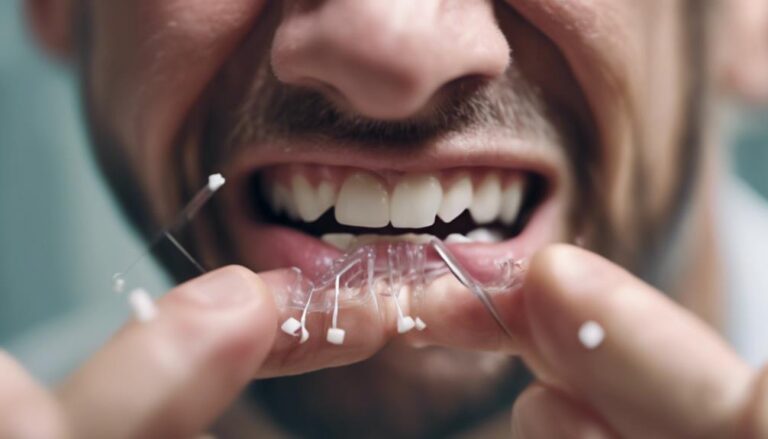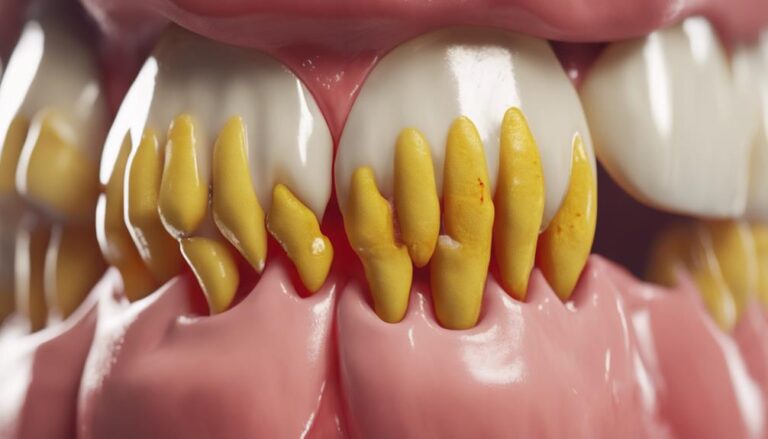Maintaining fresh breath goes beyond brushing. Holding the toothbrush at a 45-degree angle and cleaning the tongue gently can remove bacteria causing bad breath. Don’t overlook tongue scraping to efficiently reduce oral bacteria. Opt for alcohol-free mouthwash with antibacterial properties like tea tree oil. Stay hydrated to maintain saliva production and prevent dry mouth. Schedule regular dental check-ups for early detection of dental issues and personalized advice. Incorporating these key tips can help banish bad breath for good. Additional details on each technique can provide further insight into enhancing your oral hygiene routine.
Key Takeaways
- Brush teeth at a 45-degree angle for thorough plaque removal.
- Use gentle circular motions to clean all tooth surfaces effectively.
- Scrape the tongue to remove bacteria causing bad breath.
- Choose alcohol-free mouthwash with antibacterial properties.
- Stay hydrated to prevent dry mouth and reduce bacterial growth.
Brushing Techniques
To guarantee effective plaque removal and fresh breath, it’s crucial to master proper brushing techniques. Proper technique involves holding the toothbrush at a 45-degree angle towards the gum line and using gentle circular motions. Make sure that all tooth surfaces are cleaned, including the inner, outer, and chewing surfaces. Remember to brush your tongue gently to remove bacteria that can cause bad breath.
In addition to brushing, flossing is of utmost importance. Flossing helps remove plaque and food particles from between teeth and along the gum line, where your toothbrush may not reach. To floss correctly, use a piece of floss around 18 inches long, wrapping the ends around your fingers and gently guiding it between each tooth in a C shape to hug the tooth and remove debris.
Mastering these techniques won’t only help banish bad breath but also contribute to overall oral health. Remember, consistency is key in maintaining a healthy smile.
Tongue Scraping
Efficiently removing bacteria from the tongue can greatly enhance oral hygiene and combat bad breath. Tongue scraping is an important step often overlooked in oral care routines. The tongue’s surface can harbor a significant amount of oral bacteria, responsible for causing bad breath. By gently scraping the tongue, you can effectively reduce the bacterial load in your mouth, leading to fresher breath and improved oral health.
When performing tongue scraping, it is essential to reach the back of the tongue where most of the oral bacteria reside. Be gentle to avoid causing any irritation or damage to the taste buds. Here is a simple guide to help you master tongue scraping:
| Tongue Scraping Guide | |
|---|---|
| 1. Start at the back of the tongue | 3. Rinse the scraper after each pass |
| 2. Gently drag the scraper forward | 4. Repeat until no residue remains |
Mouthwash Selection
For excellent oral hygiene and fresh breath, selecting the right mouthwash is crucial. When choosing a mouthwash, opt for alcohol-free options to avoid drying out your mouth and potentially causing irritation. Alcohol-free mouthwashes are milder and gentler, making them suitable for individuals with sensitive gums.
Look for mouthwashes that contain natural ingredients like tea tree oil, aloe vera, or essential oils such as peppermint or eucalyptus. These natural ingredients not only freshen breath but also provide additional antibacterial properties to help combat oral bacteria that can cause bad breath.
Water Intake Importance
Staying sufficiently hydrated throughout the day plays an essential role in maintaining excellent oral health and combating bad breath. Hydration levels are important for saliva production, which is necessary for washing away food particles and bacteria that can cause bad breath. When we’re dehydrated, our saliva production decreases, leading to a dry mouth, which is a breeding ground for odor-causing bacteria.
Importance of water intake can’t be overstated in oral hygiene. Water helps to keep the mouth moist, preventing the buildup of bacteria that thrive in dry environments. By drinking an adequate amount of water each day, we can support saliva production and maintain excellent hydration levels, thereby reducing the risk of bad breath.
Ensuring proper hydration levels is a simple yet powerful way to promote oral health and combat bad breath. By incorporating an adequate amount of water into our daily routine, we can support saliva production, keep our mouths moist, and prevent the accumulation of bacteria that contribute to halitosis. Remember, staying hydrated is key to a fresh and healthy mouth.
Regular Dental Check-ups
Regular dental check-ups are vital for maintaining excellent oral health and preventing potential issues. As a dental professional, I understand the importance of preventive care and cavity detection during these routine visits. Here are some key reasons why regular dental check-ups are essential:
- Early Detection: Regular check-ups allow dentists to spot early signs of cavities or gum disease, enabling prompt treatment and preventing further complications.
- Professional Cleaning: Professional cleanings help remove plaque and tartar buildup that regular brushing and flossing may miss, promoting healthier teeth and gums.
- Personalized Advice: Dentists can provide personalized advice on oral hygiene practices, diet, and lifestyle habits to improve your overall oral health.
- X-rays and Examinations: Through X-rays and thorough examinations, dentists can identify hidden issues such as impacted teeth or bone loss, facilitating timely interventions.
Frequently Asked Questions
Can Certain Foods Cause Bad Breath Even With Good Oral Hygiene?
Certain foods like garlic and onions can still cause bad breath despite good oral hygiene. Food choices impact breath, but maintaining proper hygiene habits like regular brushing, flossing, and tongue scraping can help control bad breath caused by diet.
How Often Should I Replace My Toothbrush for Optimal Oral Health?
When it comes to top-notch oral health, replacing your toothbrush regularly is essential. The brushing technique you employ and the condition of your toothbrush bristles play a vital role. I’ll share expert insights on this important practice.
Are There Specific Tongue Scraping Tools Recommended for Beginners?
For beginners, it’s important to find a tongue scraping tool that is easy to handle and gentle on the tongue. Proper technique involves starting at the back and gently scraping forward. Benefits include fresher breath, but drawbacks may include gagging if not done carefully.
Can Certain Mouthwashes Stain Teeth Over Time?
I’ve found that certain mouthwashes can indeed stain teeth over time. This can happen due to the effectiveness of the mouthwash and the ingredients present. Similarly, some toothpaste ingredients may also contribute to discoloration.
Is It Necessary to Visit the Dentist if I Have No Dental Issues?
Routine checkups are necessary for preventative care. Visiting the dentist when not experiencing dental issues is important to maintain oral health. Regular exams can catch problems early and prevent them from escalating.
Conclusion
To summarize, by following these top 5 oral hygiene tips, you can easily combat bad breath and maintain a fresh and clean mouth. Remember to:
- Brush properly
- Scrape your tongue
- Choose the right mouthwash
- Stay hydrated
- Schedule regular dental check-ups
By incorporating these habits into your daily routine, you can banish bad breath and feel confident in your smile.
Keep up the good work and continue to prioritize your oral health for a happier and healthier mouth.






